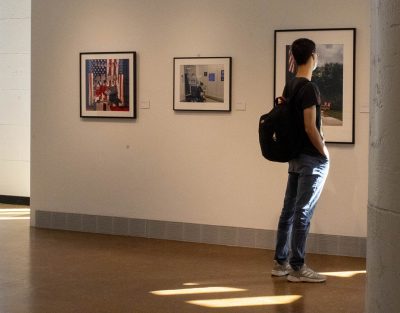By Molly Farrar and Rachel Do
Huge strides have been made for women’s rights since the ratification of the 19th Amendment in 1920. Now, just more than a hundred years later, the yellow roses — which suffragettes wore to symbolize support for the 19th Amendment — have come to the Boston University campus.

“A Yellow Rose Project,” an exhibit in the Faye G., Jo, and James Stone Gallery in the College of Fine Arts, is on display for its last week since it was put up on June 1 this summer. The traveling exhibit is a large-scale photography collection by hundreds of women photographers from across the country.
The project was created to honor the ratification of the 19th Amendment — which granted women the right to vote in the United States. August 2020 marked the centennial of the amendment, and the photographers collaborated their “response, reflection, or reaction to the ratification of the 19th Amendment” for the large photo project, according to the project’s website.
Co-founders Meg Griffiths and Frances Jakubek are both photographers who had a vision for a celebration of the centennial anniversary. They began brainstorming the project in 2019, and the project has been actively on view around the country, virtually or in-person, since fall 2020.
“We knew we wanted to include as many photographers identifying as female that wanted to participate,” Jakubek said. “We came to the idea to approach the artists in order to create work in response, whether response or reaction, however the artist wants to approach the idea of the centennial.”
Jakubek also said the project was a space to reflect and identify some of the women’s issues of today and at the time of the amendment, and recognize that the 19th Amendment did not solve all.
“[The amendment] was very problematic,” Jakubek said. “It wasn’t actually very inclusive in the 1920s, so we wanted to open up a space for dialogue to celebrate the centennial but also to highlight some of the issues with it.”
“A Yellow Rose Project” has been displayed all over the country at colleges and universities, including the University of New Mexico, Indiana University and in BU’s CFA. The project has presented almost 20 exhibitions since its premiere, Jakubek said.
Lily Brooks is a photographer originally from Massachusetts who studied at the Massachusetts College of Art and Design. She teaches photography at Southeastern Louisiana University.
Her submission honored Henriette DeLille, a nun in the 1800s who — if granted sainthood —- would be the first Black individual born in the United States to be canonized.
“It was a really obviously timely effort, and I was interested in the idea of many people, many voices addressing this 100th anniversary of women’s suffrage in a collective format,” Brooks said. “I thought that sounded like it had the potential to be really powerful.”
Brooks featured DeLille in “A Yellow Rose Project” by using her only known photograph and creating cyanotypes, a blue-tinted printing process used to colorize photographs. She said she wanted to focus on the history of New Orleans and its past of “institutional racism and the history of slavery.”
“I’m very interested in telling stories about this place, which I think is very emblematic of greater issues that occupy our history as a country,” she said about her new home, New Orleans, La.
Deedra Baker is a photographer based in Texas who contributed to the project, and said “A Yellow Rose Project” was an exciting way to work together with artists on one cohesive project.
“Knowing that it was going to probably travel, be available through virtual platforms and then other physical exhibitions, I was just really ready for an opportunity to make some new work, and to make something for a specific theme,” Baker said.
Baker said that she turned to common household objects to highlight women’s roles in our society. Her photos feature doilies and other textiles with stark lighting.
“I was really just thinking about how the resolution of the amendment was a very long battle. It included a lot of women working together and fighting for the right,” Baker said.
Baker also acknowledged while the 19th Amendment created opportunities for some women, people of color were still denied many of the same rights.
“I also had in the back of my head that it still didn’t really give everyone the right to vote. It primarily helped white women,” Baker said. “I think that’s one reason I liked the more dramatic lighting as well.”
Anne Berry, a photographer based in Atlanta, Ga., submitted photographs of a young child holding roses and holding a vintage portrait.
“I’m just proud to be part of this group of women who are making this overall statement and proud to be part of what Francis and Meg have created,” Berry said.

























































































































